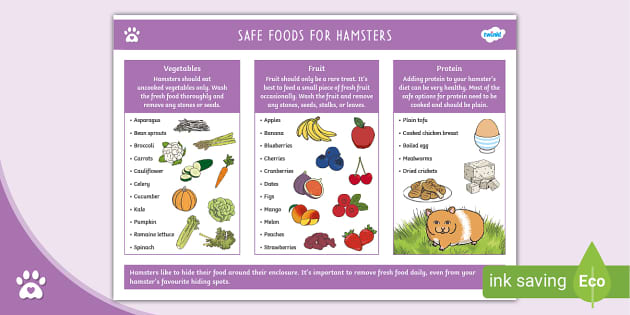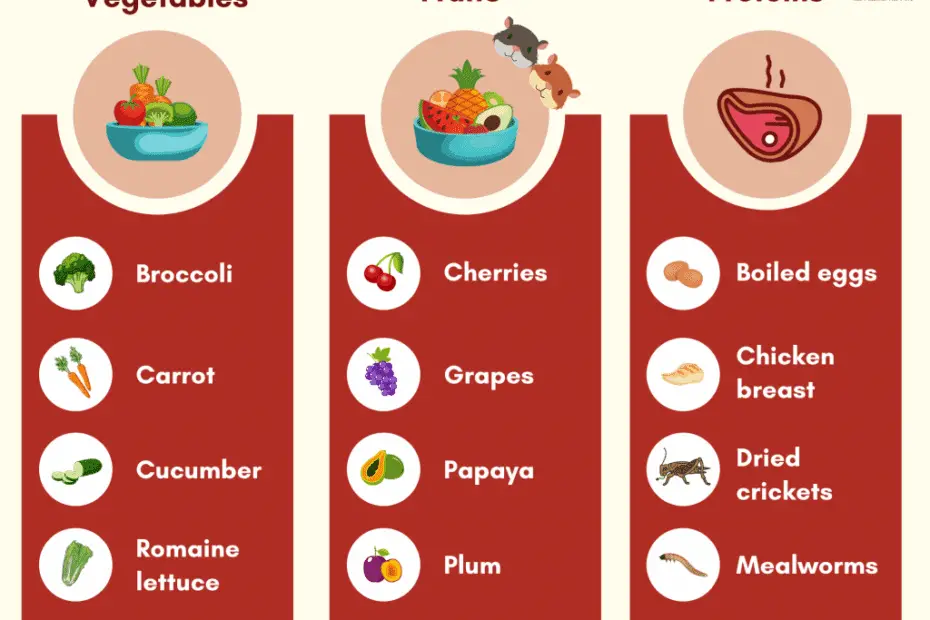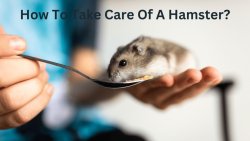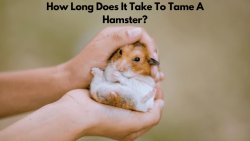A hamster typically contains around 18-20% protein in its diet. Protein is an essential element for a hamster’s growth and development, as it helps in maintaining their overall health and well-being.
Hamsters, small rodents known for their furry appearance and placid nature, are naturally omnivores, consuming a variety of food items to meet their nutritional needs. These beloved pets require an adequate amount of protein in their diet to support their active lifestyle, promote muscle development, and enhance their immune system.
Protein also aids in the repair and maintenance of their bodily tissues. Understanding the protein content in a hamster’s diet is crucial for providing them with a balanced and healthy nutritional plan. We will explore the significance of protein for hamsters, different sources of protein in their diet, and the recommended quantity of protein for these delightful companions.
Importance Of Protein For Hamsters
Hamsters rely on protein for essential bodily functions. Understanding the amount of protein in a hamster’s diet is crucial for their overall health and longevity.
Protein’s Role In Hamster Health
Hamsters may be small, but their dietary needs are just as important as any other pet. Protein, in particular, plays a crucial role in their overall health and well-being. Serving as the building blocks for tissues, muscles, enzymes, and hormones, protein helps support growth, repair body tissues, and maintain a healthy immune system for these adorable little creatures. Without sufficient protein in their diet, hamsters may experience stunted growth, weakened muscles, and a compromised immune system, leaving them more susceptible to illnesses. It is therefore essential to understand the sources of protein for hamsters to ensure their optimal health.Sources Of Protein For Hamsters
When it comes to providing protein for your furry friend, it’s important to choose the right options. Below are some animal and plant-based protein sources suitable for hamsters: Animal-Based Protein Sources: – Quality commercial hamster pellets: These pellets are specifically formulated to provide a balanced diet, including the essential proteins required by hamsters. Ensure the pellets are fresh and meet the nutritional needs of your particular hamster’s age and breed. – Insects: Hamsters are natural insectivores and can benefit from the inclusion of small amounts of insects in their diet. Options such as mealworms, crickets, and freeze-dried insects can be offered occasionally as a protein-rich treat. Plant-Based Protein Sources: – Legumes: Lentils, chickpeas, and beans are excellent sources of plant-based protein for hamsters. These legumes can be soaked and cooked before being offered to your hamster as a nutritious addition to their diet. – Nuts and seeds: Pumpkin seeds, sunflower seeds, and flaxseeds are rich in protein and can be sprinkled in small amounts on top of your hamster’s food. – Leafy greens and veggies: Dark, leafy greens like spinach and kale, as well as broccoli and peas, provide not only essential vitamins and minerals but also contribute to your hamster’s protein intake. Remember that balance is key when providing protein for your hamster. It is recommended to consult with a veterinarian or a specialist in hamster nutrition to determine the appropriate amount of protein for your specific hamster breed and age. By prioritizing their dietary needs, you can ensure your adorable furry friend stays healthy, active, and happy.Protein Requirements For Hamsters
When it comes to a hamster’s diet, understanding their protein requirements is essential for their overall health and well-being. Protein is a vital nutrient for hamsters, serving as the building blocks for muscles, tissues, and overall growth and development. In this article, we will explore the protein requirements for hamsters, including factors that affect their needs and how to determine the appropriate amount for your furry friend.
Determining Protein Needs
Hamsters have specific protein requirements based on their age, size, and activity level. Typically, adult hamsters require around 18-25% of their diet to consist of protein. This can be provided through a combination of high-quality commercial hamster food, fresh vegetables, and occasional protein-rich treats like small pieces of cooked egg or mealworms.
Factors Affecting Protein Requirements
The protein needs of hamsters can be influenced by various factors, including their life stage, such as pregnancy, lactation, or growth. Pregnant or nursing hamsters may require a higher protein intake to support their increased metabolic demands. Additionally, the breed and individual metabolism of the hamster can also impact their protein requirements.
Protein Content In Common Hamster Foods
When it comes to the nutrition of your pet hamster, understanding the protein content in their food is essential. Protein plays a crucial role in their diet, aiding in muscle development, growth, and overall health. By evaluating the protein content in common hamster foods, you can make informed decisions to ensure your pet receives a well-rounded diet.
Pellets And Commercial Food
Pellets and commercial hamster food are specifically formulated to provide essential nutrients, including protein. These products typically contain a balanced mixture of grains, seeds, and added protein sources such as soy and mealworms. The average protein content in high-quality hamster pellets and commercial food ranges from 16% to 20%, meeting your pet’s protein requirements for optimal health.
Fresh Foods And Treats
When incorporating fresh foods and treats into your hamster’s diet, it’s important to consider their protein content. Fresh vegetables and fruits like spinach, broccoli, and apples can provide additional nutrients but are not significant sources of protein. On the other hand, treats such as dried mealworms, pumpkin seeds, and nuts are rich in protein, supplementing the protein intake from their regular diet.

Credit: www.twinkl.com
Protein Deficiency In Hamsters
Just like humans, adequate nutrition is essential for the health and well-being of our furry friends, including hamsters. Protein is a crucial nutrient that plays a vital role in hamster’s growth, muscle development, and overall health. However, protein deficiency can occur in hamsters, leading to various health issues. In this section, we will explore the signs of protein deficiency in hamsters and discuss preventive measures to ensure they receive optimal protein intake.
Signs Of Protein Deficiency
Recognizing the signs of protein deficiency in your hamster is crucial to address the issue promptly. Here are some common indicators:
- Weight loss and poor body condition: A hamster with protein deficiency may experience noticeable weight loss, along with a lack of muscle tone and a generally poor body condition.
- Hair loss and dull coat: Protein plays a significant role in maintaining healthy skin and fur. A hamster lacking adequate protein may show signs of hair loss and a dull, unhealthy-looking coat.
- Lethargy and reduced activity: Hamsters with low protein levels may become increasingly lethargic, displaying a reduced desire to engage in their usual activities or exercise.
Preventing Protein Deficiency
Preventing protein deficiency in hamsters is essential to ensure their optimal health and well-being. Here are some measures you can take:
- Provide a balanced diet: Offer your hamster a well-rounded diet that includes high-quality hamster pellets, fresh vegetables, and occasional protein-rich treats, such as small amounts of cooked chicken or insects.
- Consult a veterinarian: If you suspect your hamster is not receiving enough protein or is showing signs of deficiency, consult a veterinarian specializing in small animal care. They can provide guidance on proper nutrition and recommend suitable dietary supplements if necessary.
- Monitor and adjust diet: Regularly monitor your hamster’s weight and body condition. If you notice any changes, consult with your veterinarian to determine whether adjustments to the diet are needed to address protein deficiency.
Remember, each hamster has unique nutritional needs, so it’s essential to choose a diet that suits your pet’s specific requirements. By providing a balanced and protein-rich diet, you can help prevent protein deficiency and ensure your hamster thrives in a healthy and happy environment.
Supplementing Protein In A Hamster’s Diet
Safe Protein Supplements For Hamsters
Ensure safe protein supplements for hamsters are specially formulated for their dietary needs.
Protein-rich Homemade Treats
Prepare protein-rich homemade treats to give your hamster a healthy and tasty diet variety.

Credit: www.allcreatures.co.uk

Credit: www.amazon.com
Frequently Asked Questions Of How Much Protein Is In A Hamster
What Are The Protein Needs Of Hamsters?
Hamsters need a diet rich in proteins for their growth, development, and overall health. Proteins help in muscle building, tissue repair, and maintaining a healthy immune system.
What Are Good Sources Of Protein For Hamsters?
Hamsters can get their required protein from store-bought hamster food, insects, seeds, nuts, and eggs. These sources offer a balanced protein intake essential for their well-being.
How Much Protein Should A Hamster Consume Daily?
On average, a hamster should consume about 16-20% protein in their diet daily. It is crucial to provide the right amount to support their physiological needs and energy levels.
Conclusion
To sum up, hamsters are small animals that require a protein-rich diet to thrive. Protein plays a crucial role in their growth, development, and overall health. Understanding how much protein a hamster needs is essential in providing them with the necessary nutrients for a balanced diet.
By offering a diverse range of protein sources and monitoring their intake, you can ensure your furry little friend remains healthy and happy.
- Diy Delights: Creative Ideas For Hamster Toys And Accessories - April 13, 2024
- Creating A Healthy Habitat: Essential Tips For A Happy Hamster Home - April 13, 2024
- Enrichment Galore: Boosting Your Hamster’s Happiness With Emojis - April 13, 2024


